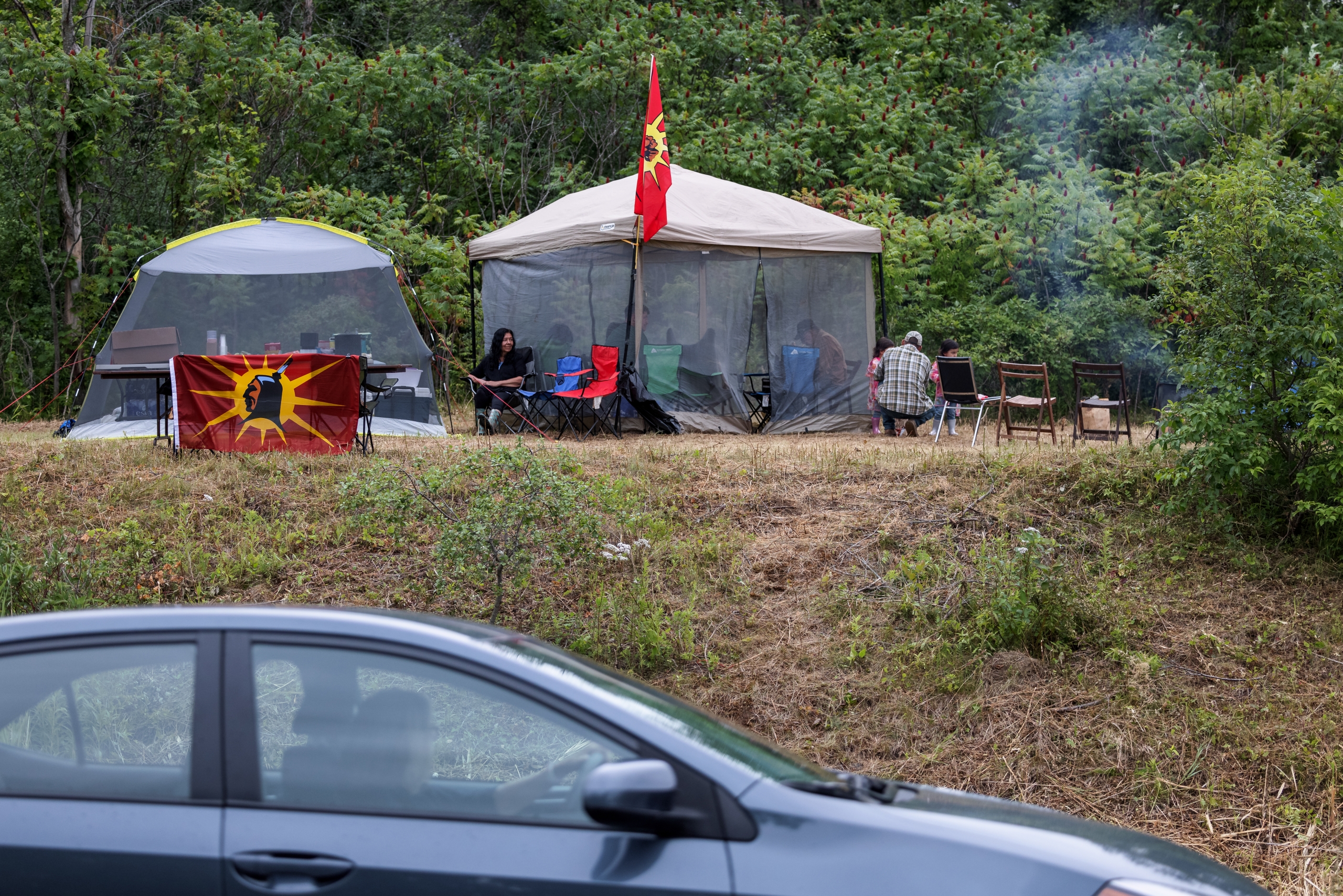Kahnawake Opposes Châteauguay Residential Project

Members of the Kahnawake community have been camping near Chemin Saint-Bernard. (Photo : Denis Germain)
For the past few days, members of the Kahnawake community have been camping on land adjacent to a proposed residential project in Châteauguay. Organized by the Kanien’kehá:ka Nation of Kahnawake, the community’s traditional branch, and supported by the Band Council, the camp opposes a 290-unit housing project that would be built on land claimed by the Mohawks.
(Translation Amanda Bennett)
The project proposes to build 38 single family detached units, 34 single family semi-detached units and 218 single family row houses on land located between Robert West Street in Châteauguay and the Kahnawake border.
The camp is located on Châteauguay’s border at the Chemin Saint-Bernard/Old Chateauguay Road, on a portion of land that was recently returned to Kahnawake as part of the negotiations for the Highway 30 construction.
“We are still owed a significant amount of land from the Quebec government for the taking of the Highway 30 lands that cut through our territory to the amount of 211 acres,” explained Grand Chief Kahsennenhawe Sky-Deer. “That property would have made perfect sense because it is not developed at this point. It is unoccupied,” she said in reference to the project lot in Châteauguay.
In addition, the Mohawk Council of Kahnawake (MCK) stated that the project is slated on the former Seigneury of Sault St. Louis land, which is still under negotiation between the Mohawk community and the governments of Quebec and Canada.
“The land grievance has remained unresolved since it was formally launched in 2004. In fact, negotiations have been at a standstill since 2016,” expressed the MCK via press release.
The Kanien’kehá:ka Nation of Kahnawake, a traditional organization within the community, says it is also concerned about the traffic increase that would be generated by the residential project. “This development would cause disruption and disharmony being so close to our community and will flood the Old Chateauguay Road with unwanted traffic from Châteauguay,” indicated the Kanien’kehá:ka Nation in a press release.
Discussions with the City of Châteauguay
The City of Châteauguay informed the Band Council about the real estate project from the start. The two discussed the issue in February 2021. The MCK said that during that meeting, it had indicated to Châteauguay it would be sending an official letter expressing its opposition to the project.
On March 15, Châteauguay’s municipal council adopted a zoning change to allow buildings with more than four units to be established in that sector.
For its part, the Mohawk Council of Kahnawake maintains it had not been informed of the zoning change. “We found out through back channels. So, it’s unfortunate that when we try to sit down and have people see things from our perspective, we tend not to be acknowledged,” explained Sky-Deer.
In an interview with the Soleil de Châteauguay, Châteauguay Mayor Pierre-Paul Routhier assured that the City has kept its neighbour informed since the very beginning. “I have never concealed anything from Kahnawake, especially considering that it’s our closest neighbour,” he explained.
He says the native community’s opposition to Châteauguay’s construction project is being used to advance stalled territorial negotiations with the federal and provincial governments. “It is an issue that extends well beyond the project in Châteauguay,” Mr. Routhier stressed.
Calls to Other Levels of Government
The MCK affirmed that letters have also been sent to Canadian Prime Minister Justin Trudeau, to the Minister of Crown-Indigenous Relations, Carolyn Bennett, to Quebec Premier François Legault and to the Quebec Minister Responsible for Indigenous Affairs, Ian Lafrenière.
The Band Council suggested that the federal government appoint a special ministerial representative to work on the Seigneury of Sault St. Louis land grievance. It also asked the Canadian government to create an action plan to halt Châteauguay’s residential project while exploring the possibility of purchasing the lands.
Like the MCK, the City of Châteauguay intends to send letters to the federal and provincial governments requesting their intervention.
Asked whether the city could decide to put the project on the back burner, the mayor said it would be premature to reply.
The mayor explained that no permits have been issued to date. “There are still a lot of plans and specs to be carried out,” he said.
He did, however, say that he does not want to be in a dispute with the neighbouring community. “It’s important to have good relationships with one’s neighbours. They are historic neighbours with whom we do business,” mentioned Mr. Routhier.